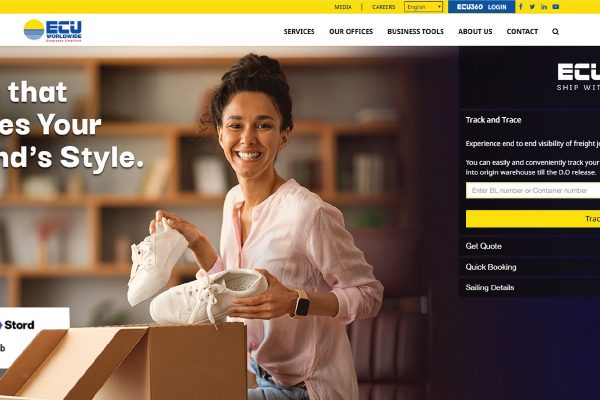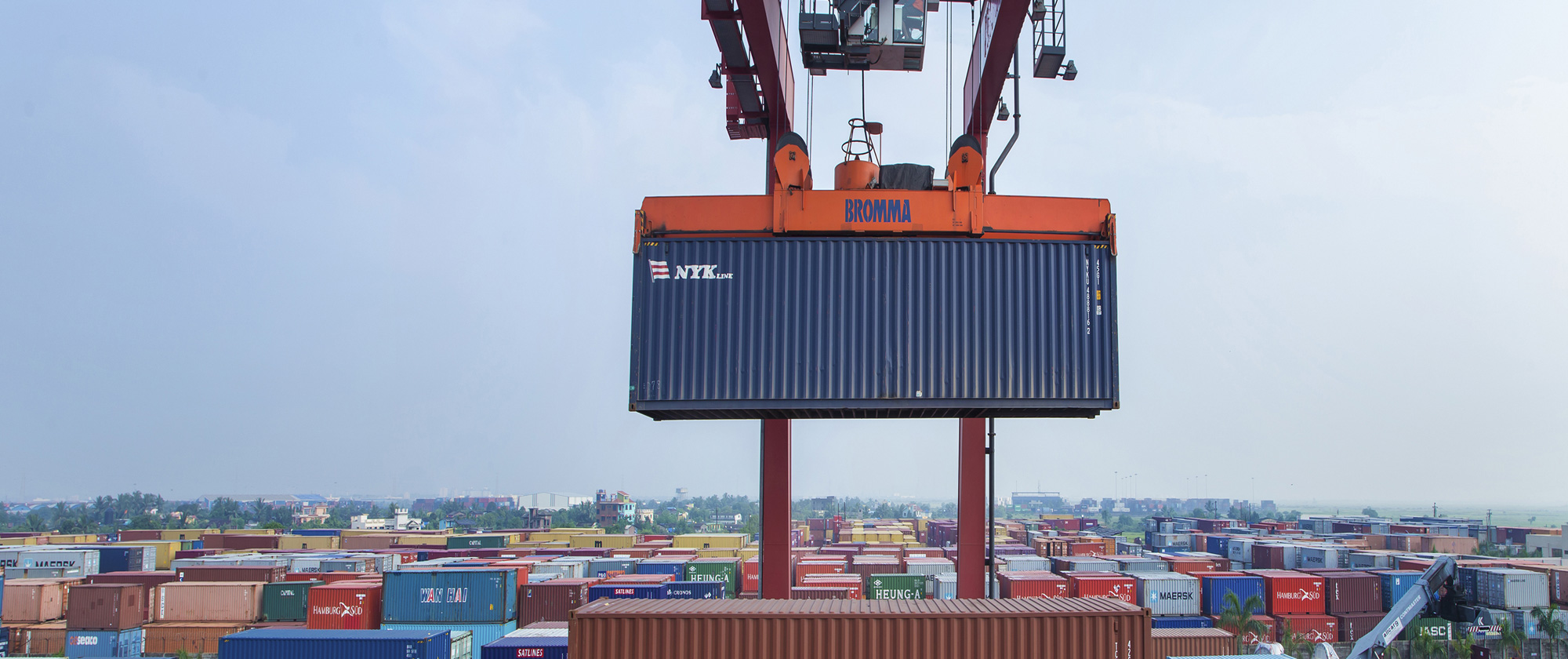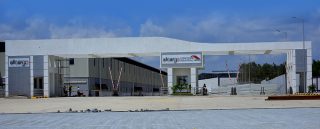Allcargo offers the widest network and all our Container Freight Stations (CFS) offer world-class facilities and strong connectivity within India as well as neighbouring countries in the Indian subcontinent. The network spans CFS’ in Mundra, Nhava Sheva, Chennai, Kolkata, and an Inland Container Depot (ICD) in Dadri. Each of these facilities gives their customers a unique edge. As India gets more closely integrated into global trade, a strong infrastructure backbone, especially ports and surrounding facilities and notably a robust CFS-ICD network is crucial. Allcargo, with its expansive network is ideally positioned to help transport cargo to and fro quickly, efficiently and safely.
Ports play a pivotal role in India’s EXIM trade. According to the country’s Ministry of Shipping, they handle 90% by volume and 70% by value of foreign trade. However, over the past decade, the existing port infrastructure has struggled to handle trade flows efficiently, leading to delays across the value chain. Sensing the opportunity to help solve this maritime gridlock, Allcargo entered the Container Freight Station (CFS) business, complementing its existing Less than Container Load (LCL) and Full Container Load (FCL) businesses.
Today, Allcargo offers the widest network and all its CFS’ offer world-class facilities and strong connectivity within India as well as neighbouring countries in the Indian subcontinent. The company’s facilities span Mundra, Nhava Sheva, Chennai, Kolkata and an Inland Container Depot (ICD) at Dadri. Each of these facilities gives their customers a unique edge.
Strategic locations
Allcargo’s Chennai CFS, for example, helps customers with a first-in-India service: an international trans-shipment hub catering to customers worldwide. The CFS in Chennai was one of the earliest to come up in the region and offers customers the huge benefit of its advantageous location. Located just 9 km from the port, it offers customers a shorter transit time, given that the road to the port experiences high traffic congestion. The hub is also used by importers who wish to take advantage of the shorter transit times.
This pioneering example in Chennai is just one example of how Allcargo is leading the way in India’s CFS revolution. It is the only company to have CFS’ across all major ports of India which handle more than 80% of container traffic. Building on the success of its first CFS at JNPT in Mumbai, Allcargo moved on to establish CFS facilities at Chennai in the south of India which caters to destinations in the Far East, Mundra in Gujarat which serves as a gateway to the northern regions, Kolkata in the east which offers connectivity to India’s north-eastern regions and countries like Nepal, Bangladesh and Bhutan, as well as an ICD at Dadri to cater to hinterlands away from the ports. All these facilities are located at vital trade hubs across the country and adhere to international quality and safety standards.
Setting us apart
With Authorized Economic Operator (AEO)-certified CFS-ICD units present across the country, being operational 24/7 has given Allcargo an edge over the competition. For a start, customers can now clear their cargo at their convenience, which offers them the flexibility to plan their consignment logistics. Allcargo’s CFS’ offer 3.5 lakh sq. ft. of bonded warehousing facility and its facilities are unique in many ways: take the JNPT CFS facility, which was one of the first in the region to install a Rubber Tyred Gantry (RTG) crane. The facility also houses special reefer charging points for refrigerated cargo and even provides empty container repair services to the shipping lines. Elsewhere, the CFS in Chennai pioneered the technology of tagging containers with close-range passive RFID tags and uses this to track and locate containers anywhere within the CFS.
CFS-ICD units play an important role in world trade and India’s move to get a larger chunk of this pie. However, as recently as last year, there was some uncertainty over the space as the government dithered over the way forward, initially mooting a direct port delivery scheme, before changing its mind and favouring CFS players again.
The future
As India seeks to make an impact on the global trade stage, a strong CFS network is likely to play a vital role in this process. In July this year, a study by Confederation of Indian Industry (CII), the industry trade lobby, identified 31 products such as women’s apparel, drugs, and cyclic hydrocarbons that have high export potential and can make India a top exporter of these products.
A month after India’s exports fell for the first time in eight months, in June 2019, the industry body recommended strengthening industry clusters and related infrastructure including port connectivity among a host of measures to reignite growth. Ironically, India is perhaps the only Asian economy whose export share has grown since tariff wars broke out between the USA and China. Part of the reason for India’s outperformance is that it’s not as integrated into global manufacturing supply chains as peers, which means exporters are cushioned from rising trade tensions in the region.
However, as India gets more closely integrated into global trade, this cushion may not last for long. To stay competitive and to keep growth sustained, a strong infrastructure backbone, especially ports and surrounding facilities and notably a robust CFS-ICD network is crucial. Allcargo offers India’s widest CFS network and is ideally positioned to help transport cargo to and fro quickly, efficiently and safely.
Value-added services and safety
Services at the CFS facilities include import handling, export handling, direct port delivery, LCL shipment, bonded and general warehousing, transportation, specialised cargo handling, maintenance and repair of dry containers, reefer monitoring service, hazmat handling, etc. RTG cranes and forklifts have been deployed to enable faster throughput, along with the latest equipment and apps to ensure faster movement of cargo and track and trace.
Allcargo’s facilities comply with international standards and offer customers a world-class experience. Pilferage-free facilities and constant CCTV monitoring ensure the safety of their cargo. Bonded and non-bonded warehouse facilities give customers the flexibility in planning their working capital and finance requirements.
The company’s CFS facilities also have multiple certifications, a prerequisite for EXIM trade and therefore comply with the most stringent checks and measures. All of Allcargo’s CFS facilities are OHSAS 18001:2007, ISO 9001:2008, AEO certified and Customs-Trade Partnership Against Terrorism (C-TPAT) compliant. An AEO tag recognised quality mark indicates the business’ secure role in the international supply chain and that their customs procedures are efficient and compliant. Meanwhile, a C-TPAT certificate increases the speed and reduces the time for freight movement, because it gives access to free and secure trade (FAST) lanes at land borders, ability to move to the front of inspection lines, lower odds of CBP examinations and exemption from Stratified Exams, among many other benefits.
Along the way, Allcargo’s facilities have also kept up with the latest technological advances. E-tariff, e-Proforma and e-Payment technology helps save time, reduces redundancy and ensures consistency of record-keeping. A digital control tower helps keep track of activities at the CFS, and web and mobile technologies make real-time, accurate track and trace of containers possible.
As India prepares to integrate more closely with the global economy and trade, its ports, and especially a robust CFS-ICD network will play a crucial role in this transformation.
“The role of CFS-ICD network only gets more important as India advances towards growth and ease of doing business. A strong land side logistics is as crucial as the EXIM trade to complete the value chain and make it more efficient. Allcargo is the only company in India to provide end to end logistics solutions with its state-of-the-art facilities, services and experience,” said Adarsh Hegde, Joint Managing Director, Allcargo Logistics Ltd.














